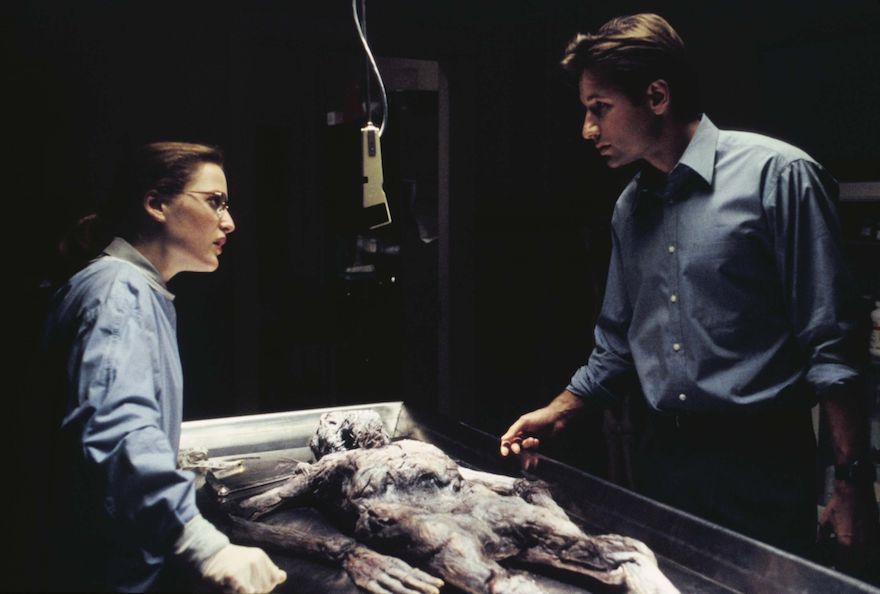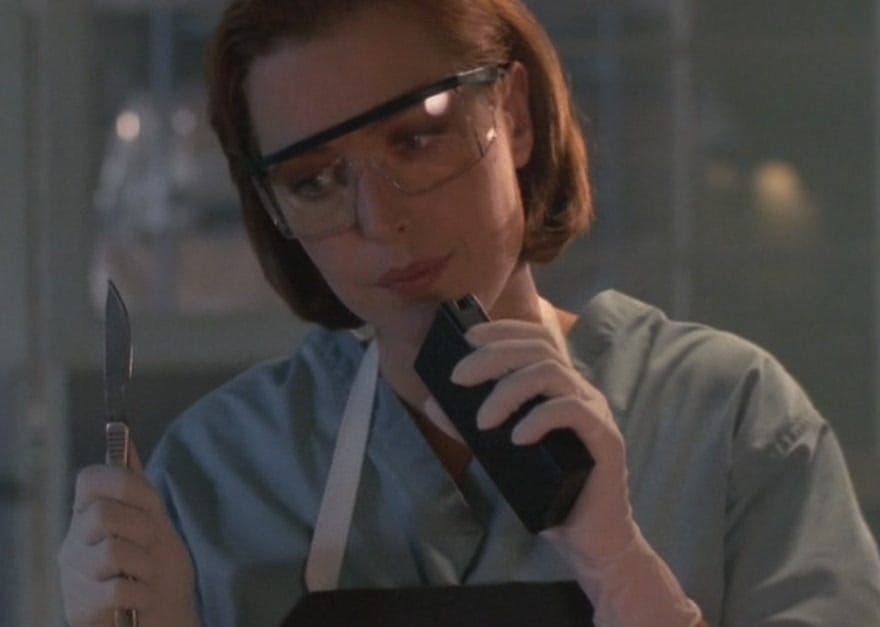The glorious return of The X-Files, TV’s greatest science show

There was one point in my life where I thought about becoming a member of the FBI. In the months prior to my graduation from college, I had decided that I could put the 200+ hours that I had invested into The X-Files to good use. Of course, after I learned of the trials and tribulations one had to go through to get there (like a fitness test, and the ability to overcome the fear of being near a gun), my weak noodle arms and I dropped the idea. I also played with the idea of becoming a Ufologist for a few days, but had a very hard time figuring out how I would make enough money doing that to sustain living, aside from working for the History Channel. I eventually settled into a PR job working in a cubicle with an “I Want to Believe” mousepad.
It doesn’t amaze me how much of an impact a television show has on me; I fairly easily envelop the things I love and integrate them into a part of my daily life. I related well to Mulder’s blind determination and obsessive personality, and Scully was a grounding role-model for me, who would stand up for herself in the face of any man or monster. What does amaze me is just how many people the show actually had an impact on; for example, the phrase “shipping” is residue from early ’90s message boards dedicated to Mulder and Scully’s relationship. The show’s relaunch has given cause for many such reevaluations, and one of the people on that relaunch is Anne Simon, who serves as the show’s science experts as well as a Biology professor at University of Maryland.

“[The X-Files] really had an impact on science,” she told me recently. “It portrays science in a positive light. Scully was portrayed as a real scientist. She was caring and human. I asked one of my biology classes, ‘How many of you went into the field because of The X-Files?’ and half of the hands in the class went up.”
Because of the show’s impact on me, I was initially ecstatic when they announced the mini-series due out in January. This was immediately followed by trepidation from what seemed like me and every X-Files fan on Tumblr. What if they fuck up? They’ve broken up Mulder and Scully, what’s not to say that they’ll break the entire show?
But I’m confident, after giving it some more thought, that everything will be fine. This is because the science is there.
It portrays science in a positive light
When trying to figure out the real MVP of The X-Files, everything needs to be taken into account: the relationship between Mulder and Scully, the agents (including Doggett and Reyes, who are greatly underappreciated), the aliens, CSM, the Lone Gunmen, etc. For a while, I thought it was Scully. It’s not. After spending months trudging through the abominations that are season eight and season nine, with Scully’s 13-month pregnancy and sudden belief in aliens, and Mulder’s vague brain illness (and total disappearance), I realized the thing I really missed the most was not, to my surprise, David Duchovny, but the strong science foundation that the show had always weirdly maintained. It somehow made every episode more believable, even when bees are carrying government-manufactured alien diseases seemingly designed specifically to ruin any chance that pre-season seven Scully and Mulder had at romance.
If you don’t believe me, take a moment to reflect on the rightly acclaimed episode “Post-Modern Prometheus.” The episode follows Mulder and Scully investigating a mysterious pregnancy, after a woman is attacked by her child’s “comic book creation,” The Great Mutato. Apparently, X-Files showrunner Chris Carter wrote it while on a Cher kick because it features a couple of her songs and the 1985 film Mask (as someone who experienced a Cher kick at the age of eight, I was wickedly obsessed with this episode). We love it because of the shipping fuel—Scully and Mulder dance together to “Walking in Memphis”—and because Cher is actually the only reason most of us carry on with our day-to-day lives, sure, but maybe there’s a subtle reason behind the love, too. The entire time you’re enjoying this weird Frankenstein riff, Simon’s scientific ideas are whirring away in the background, making the whole thing seem plausible.

“‘Post-Modern Prometheus’ was the first episode where Chris (Carter) based the script off of one of my ideas,” said Simon. “It’s become one of my favourite episodes. I was even asked to live-tweet it for the X-Files countdown on Fox.”
The scientific explanations interwoven throughout the show are what make monsters like the Flukeman and plotlines like the government-distributed diseases so memorable. I mean, Mulder would be unrelatable if there was no scientific basis to any of his claims; people who spew conspiracies with no basis in reality are often pretty easy to disregard. That’s why it’s important for Mulder to have Scully, a scientist and a medical doctor, and a background in psychology: these practices help describe unscientific events and beings. The new miniseries looks to continue to honor science. Simon is even credited as a writer in one of the new episodes.
The new miniseries looks to continue to honor science
“I don’t write for the show, I give the ideas. I’ve put more into the new season than previously before,” said Simon. “I had a really good idea and Chris incorporated it into the central plot of this mini-series. For this new episode, episode six, I came up with the background for the entire episode.” Not giving too much away about the episodes, Simon also said Scully would be a focal point of two episodes.
While it’s devastating that Mulder and Scully are separated and have found different partners and moved away from each other, I don’t think we have a lot to worry about. The most important things will all be there: Scully, Mulder, The Lone Gunmen, Reyes, Skinner and the scientific narrative that pulls all of the characters together and makes every adventure believe. And anyway, nothing The X-Files ever produces will be as bad as its terrible PlayStation 2 game Resist or Serve. At least we’re all safe from that now.



